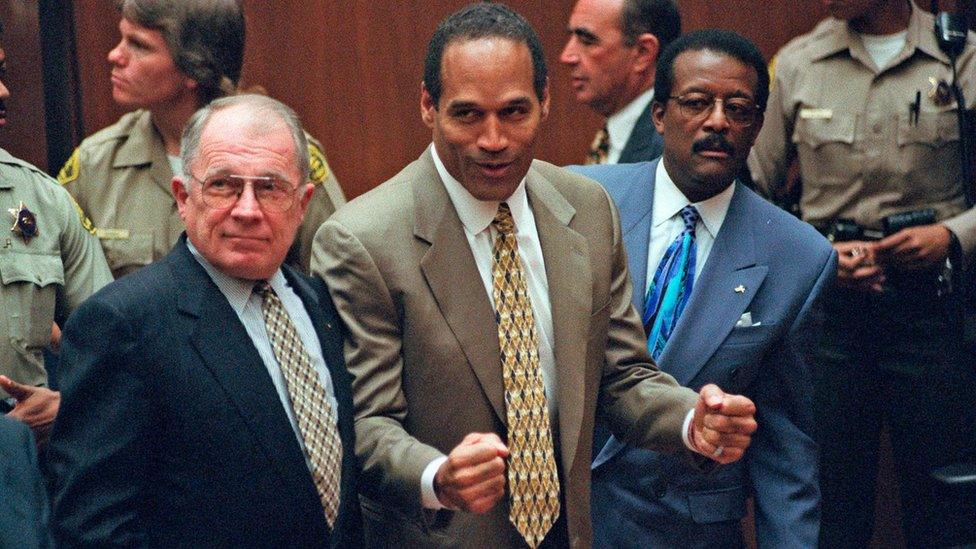OJ Simpson obituary: The spectacular fall of an all-American sport star
- Published
OJ Simpson: His life and the trial that defined it
The story of Orenthal James - "OJ" - Simpson is about a fallen hero. The former American football star and Hollywood celebrity, who died on Thursday aged 76, went on in his later life to spectacularly make headlines for all the wrong reasons.
After convincing a jury of his innocence in a double murder case, he was later convicted in Las Vegas of armed robbery and conspiracy to kidnap.
The incident came more than a decade after he was cleared of the murder of his ex-wife, Nicole Brown Simpson, and her friend Ronald Goldman.
That famous trial started in 1995 and contained the blockbuster ingredients of money, murder, fame and sex.
The trial gripped the US, and much of the rest of the world, for an entire year, and dramas and documentaries inspired by the case continue to enthral audiences.
The jury's decision remains a subject of heated debate in popular culture to this day.
Turning point
Before 1994, Simpson was regarded with affection by the public, well known as a professional athlete, actor and million-dollar spokesman for several US companies.
Things appeared to always work out for "the Juice". He had gone from a poor San Francisco neighbourhood, where he grew up, to a home in the wealthy boulevards of west Los Angeles via a glittering American football career.
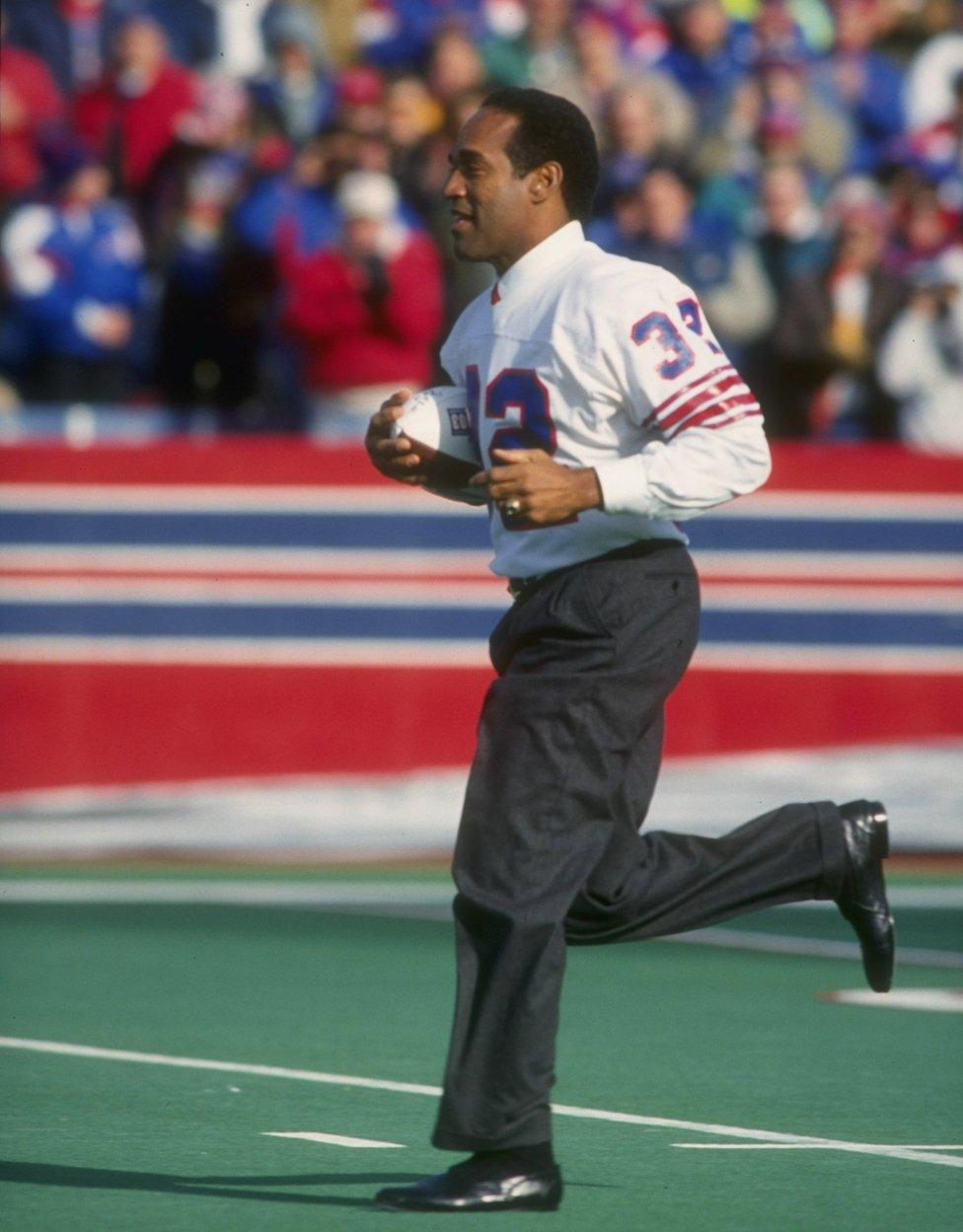
Fans continued to adore him long after his career as a running back ended
It all changed when he became the main suspect in his ex-wife's murder. Millions of Americans watched as the police chased his white Bronco car for 90 minutes live on TV. He finally gave himself up outside his LA home.
Throughout his career OJ had worked hard to rise above race and become an all-American hero.
In 1969, in an interview with the New York Times, he stated that his biggest accomplishment was that "people looked at me like a man, not a black man".
But years later, in the Los Angeles courtroom, his race came to the forefront.

OJ's police car chase was broadcast across the US
Public opinion on his guilt divided along racial lines, and revealed a large chasm between black and white Americans' perception of the police.
His lawyer, Johnnie Cochran, argued to the mostly black jury that police had planted evidence in an attempt to frame Simpson because he was a black superstar. Critics accused him of playing the "race card".
Simpson's attorneys played recordings of Los Angles police detective Mark Furhman, who had found the bloodied glove, using racial slurs, and called witnesses who testified he had made racist comments.
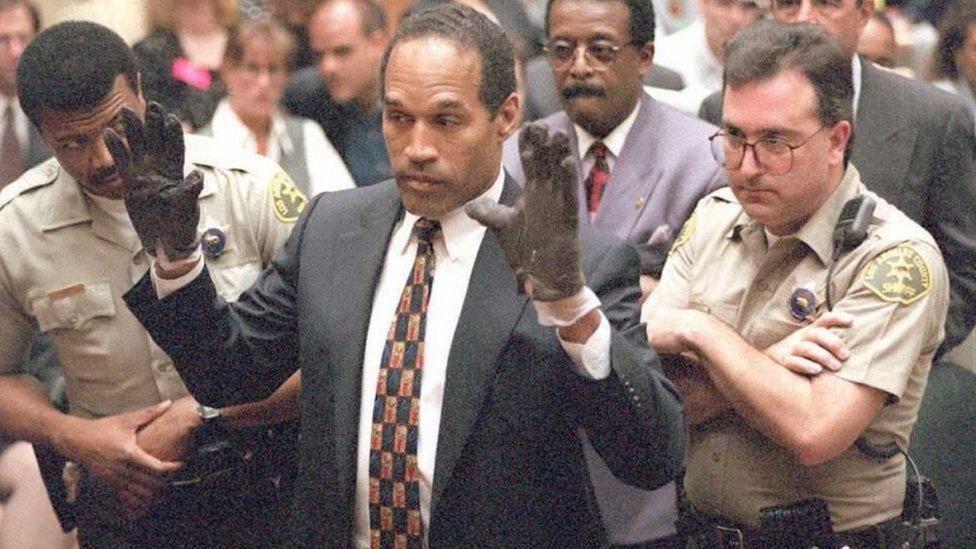
'If the glove doesn't fit, you must acquit', his lawyer argued
The verdict proved similarly divisive once the jury voted to acquit Simpson after just hours of deliberation. There was widespread outrage among white Americans after Simpson walked free, but the majority of black Americans supported it.
The trial led many to ask the question: Who was the real OJ Simpson?
There was no denying that he had been very much loved by the public who viewed him as gentle, generous, hard-working and charismatic. He and Nicole Brown, whom he married in 1985, played the perfect, handsome couple.
But the court case threw up a darker side, with the prosecution's emphasis on Simpson's violent relationship with his ex-wife.
There was the now-infamous incident of New Year's Day 1989 when police were summoned to their home to find Nicole outside, her eye blackened and her lip bloodied. She fell into an officer's arms, sobbing and screaming: "He's going to kill me."
Nicole decided not to press charges, but the city lawyer went ahead and prosecuted OJ for spousal battery. He was fined and given two years' probation.
They remained together for another three volatile years before they divorced.
All-American hero
Simpson was born in 1947. He was a bow-legged child who had rickets, but was able to escape poverty in San Francisco because he was an extremely good runner. He eventually went on to become one of the top running backs in American football history.
He attended the University of Southern California, where he was named the country's top college football player in 1968. He then moved to Buffalo, New York, where he spent most of his career.
In 1979, he was forced to retire due to injuries. By then, however, he was making his mark as a Hollywood actor.
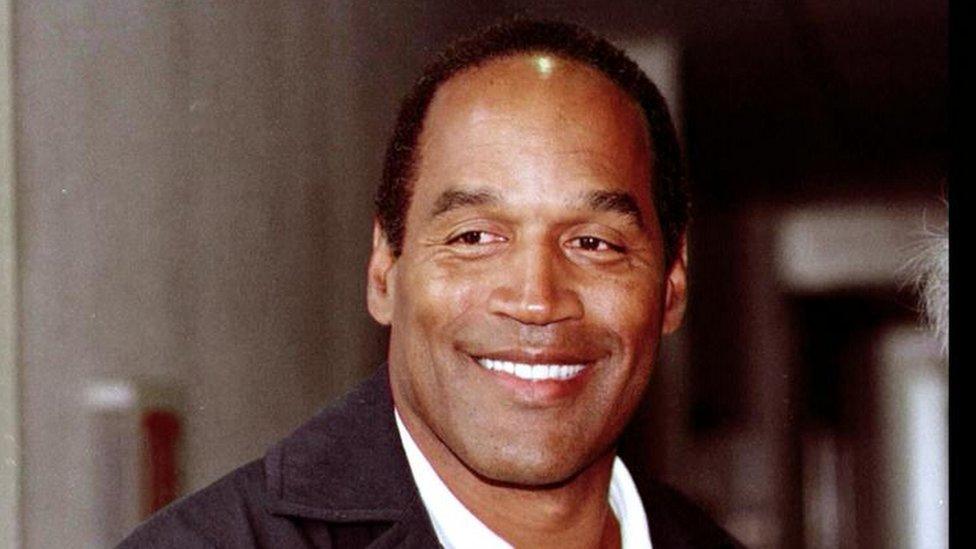
Between 1973 and 1994, he appeared in more than 20 films including The Towering Inferno and the Naked Gun films. He also won some lucrative television advertising deals.
After the 1995 murder trial things were never the same for Simpson.
Those professional accomplishments were effectively negated in the public imagination, as many Americans came to solely associate him with the death of his ex-wife and her friend, despite the acquittal.
He was later found liable for the deaths in a civil trial brought by the Brown and Goldman family and ordered to pay them $33.5m in damages.
He pursued a relatively quiet life, playing golf and focusing on his four children - two from his first marriage to a childhood sweetheart in the 1960s and two from his marriage to Nicole.
At times, however, Simpson appeared to lean into his now-infamous reputation.
In 2006 he was back in the spotlight, after a $3.5m (£1.8m) deal he reached with Rupert Murdoch's broadcasting and publishing companies sparked public outrage.
The deal included the publication of Simpson's ghost-written, "hypothetical" account of the murders, If I Did It, as well as an interview for Fox TV.
The rights were later sold to the Goldman family, who significantly shrank the size of the word "If" on the cover, and added the subtitle "Confessions of the Killer".
In 2008, he was convicted of armed robbery and conspiracy to kidnap stemming from an organised raid in a Las Vegas hotel room.
Simpson claimed that the men were trying to sell his personal memorabilia. He served nine years in prison, and his parole ended in 2021.
After his prison sentence, Simpson tried to reset his public image. He joined Twitter, now known as X, in 2019. He generated no small degree of controversy with a debut message declaring he had a "little gettin' even to do."On 11 February, the former football star posted his final video to X. "My health is good," he told his followers. "Obviously I'm dealing with some issues. But hey, I think I'm just about over it.""I'll be back on that golf course, hopefully, in a couple weeks," he said.
Related topics
- Published20 July 2017
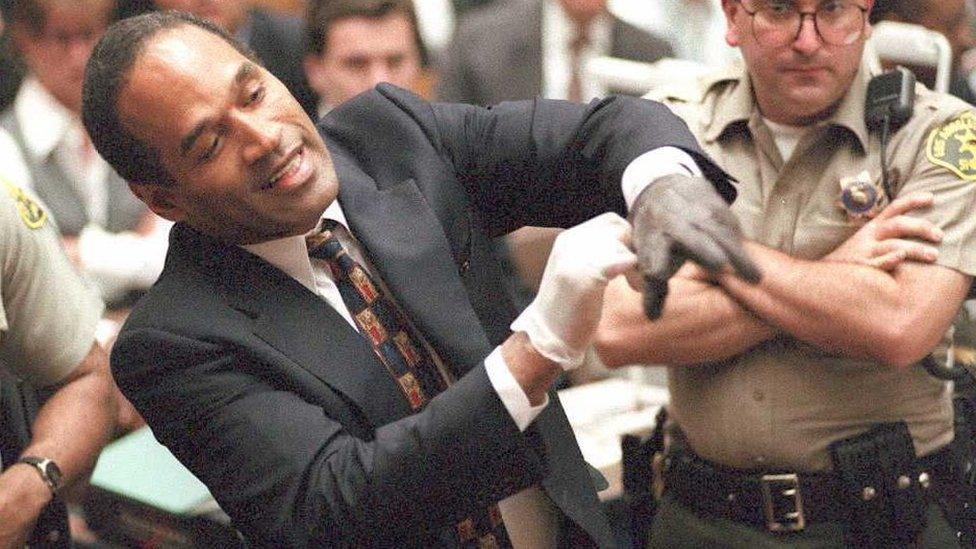
- Published1 April 2016
